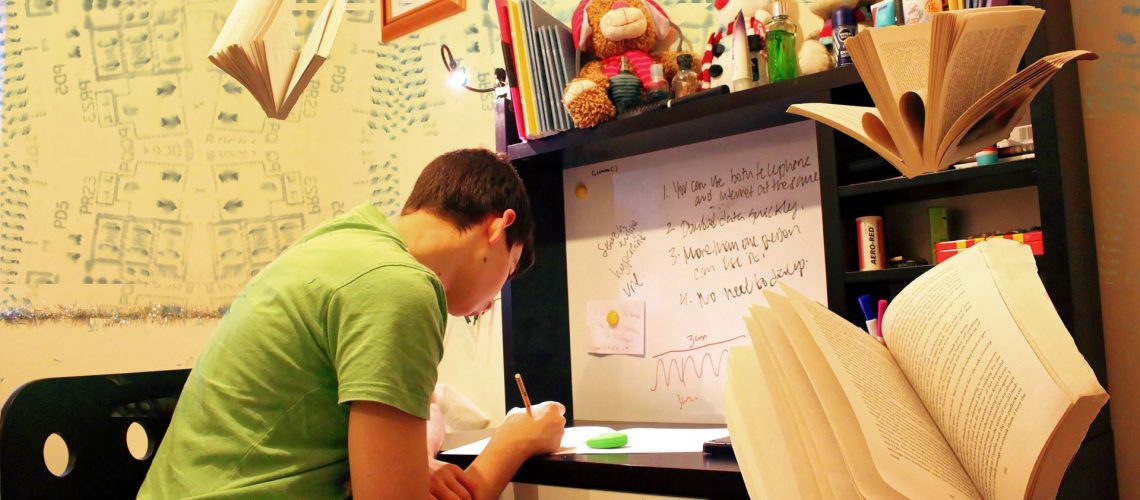I just renamed ADHD. I now think of this existence (note, I avoided the dreaded word, disorder) as HYPER ATTENTION ACTIVITY DEFICIT. I’ve been thinking about the term ADHD for a long time. It implies that the affected person cannot pay attention. But for a long time I’ve known that it means the person can pay attention to many things at once, thereby looking like (s)he is not paying attention to anything. Yes, of course, this can be a deficit for instance while driving, or doing anything rote – including taking a test on something you find boring. Sleeping can also be challenging as the ADHD mind tends to wander when at rest. But it isn’t that this mind cannot pay attention, this mind needs to think about a lot of things all at once.
This is why listening to loud music is such an effective strategy for “monkey minds” to get some sleep. They are forcing their minds away from all the things they want to think about and focusing on something they caused to overshadow everything else.
This is why doodling, pacing or even reading during class is an effective strategy for paying attention. I remember my son’s kindergarten teachers commenting that whenever someone observed their classroom they inevitably asked why the student who seemed to pay the least attention knew all the answers? My son walked around the room, played with legos, looked at books and then when the teachers would ask a question, his hand would shoot up and he’d have the correct answer. It’s when kids like these are forced to do only one thing that they are challenged to do anything.
It’s no wonder these kids who undergo neuropsychological testing are often diagnosed with slow processing speed and working memory issues. If the question, for instance, mentions that the character in a paragraph is wearing a red dress, the highly attuned – hyper attentive – mind may think, “hmmm, I wonder if the red dress is short sleeved or long sleeved? Is it warm enough for short sleeves? Is it a formal dress or casual? I wonder where she is going? I wonder if the dress is new? I’d like a red dress.” Clearly going down those rabbit holes will determine a slower processing speed. And with all those details running around in their brain, being able to hold on to the pertinent information and manipulate it, as working memory requires, can pose a challenge.
A client once shared that when her son visited a private school she received a phone call from the admissions director stating that he walked around the classroom looking at the posters on the wall. The admissions director labeled this “behavior” as disruptive and reported that the teacher was upset by it. The student, thankfully unaware of his “offensive” behavior, came home and excitedly began spewing facts and statistics he memorized from those posters. Of course it can be hard for others to concentrate while a fellow student is walking the perimeter of the classroom, but a simple appreciation and intervention – hand placed gently on the shoulder and a statement like – “Isn’t that information interesting Jonny? I can see how eager you are to read all the posters in our classroom. How about a few minutes before class ends I give you an opportunity to look at them and if you don’t finish you can come in at the end of the day and I’ll be happy to discuss them with you?” What an incredible opportunity that would have been for both of them. This child was able to pay attention to many things at the same time, which his peers were unable to do – in fact his presence on the perimeter of the classroom was keeping them (and the teacher) from being able to attend. Who has the attention deficit now? Bottom line, normalizing this distractible curiosity rather than shaming or reacting negatively, goes a long way in role modeling empathy and teaching acceptance of differences.
Hyperactivity; such a loaded term. How many adults wouldn’t give up a whole lot to have “excess energy?” These kids naturally have it. And again, like their ability to focus on many things at the same time, they can fire all sorts of psychomotor neurons indefinitely. This is a challenge if the world isn’t set up for their kinesthetic tendencies. But movement allows our brains to work more efficiently. Maybe that’s why these kids can do more than one thing at once. They are like their own personal brain generators. No wonder teachers are instituting creative “brain breaks” that include movement for their students.
So as I reflect on the challenges kids face who are bright and distractible, I can’t help but wonder why our society insists on changing these kids? Why not change the environment and encourage questioning, invigorating, thoughtful processes that these kids’ brains yearn to undergo. Flexibility, understanding, positive reframes and strength identification go a long way and must replace the assumptions, judgments and fixed mindsets of today’s classrooms and homes.

Author: Julie F. Skolnick M.A., J.D.
Julie Skolnick, M.A., J.D., is the Founder of With Understanding Comes Calm, LLC, through which she passionately guides parents of gifted and distractible children, mentors 2e adults, and collaborates with and advises educators and professionals on bringing out the best and raising self-confidence in their students and clients.


8 Responses
I have a 6 yr old son who is exactly like this! How can I set up my home so he is thriving, more productive and challenged? Especially now that he will be in elementary this fall. Any resources and books can you recommend for further reading? Thank you 😊
Thank you for your comment. The first books I recommend are A Parent’s Guide to Gifted Children by Jim Webb, et al. and To Be Gifted and Learning Disabled by Susan Baum, et al. Other than that, please feel free to reach out to me via email at Julie @WithUnderstandingComesCalm.com and I will provide my scheduling link if you would like to set up a free 20 minute phone consultation. Starting now to think about how to advocate for your child will go a long way for his success and self confidence.
I’m still learning from you, but I’m improving myself.
I absolutely love reading all that is posted on your blog.Keep the information coming.
I liked it!
Thanks so much for the feedback, I’m thrilled that my words have touched you and that you continue to learn!
This describes my 9th-grade son perfectly, and thankfully, he is already surrounded by amazing instructors at Bridges. However, I wanted to ask if you have any advice about the issue we find during online learning (and, presumably, at school, when he’s there) – flipping between screens during class. I can’t take the internet off his laptop, which he needs for Zoom classes. He already has a self-soothing fidget that he does with his foot during class. So much going on in his world/brain! Any ideas on keeping the screen on class, as I can’t be in the same room all day. Thanks.
Thank you for your comment. Yes, engagement is a huge challenge right now – more than usual. As with many issues for our 2e children, the first place to start is by asking what is going on for him. Does it happen in every class and with every teacher. Does he have the option to get up and walk around and get a snack if he needs. The next step is to share what you observe and what you learn with his teachers and to collaborate to hatch a plan. Giving the benefit of the doubt and addressing needs fosters trust and allows for durable strategies.
exactly – why do society want to change these kids (people) instead of learning to collaborate in ways that works for both … I agree with you … it is not that an ADHD-brain can not concentrate, it is that it hyper-focus on so many things at the same time … I am so sharing your article to my local support group and where ever I can!!
Thank you! I am so glad the blog resonates and we appreciate you helping us spread the word!